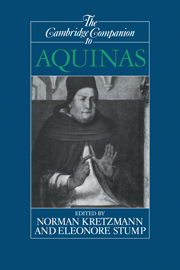Book contents
- Frontmatter
- Introduction
- 1 Aquinas's philosophy in its historical setting
- 2 Aristotle and Aquinas
- 3 Aquinas and Islamic and Jewish thinkers
- 4 Metaphysics
- 5 Philosophy of mind
- 6 Theory of knowledge
- 7 Ethics
- 8 Law and politics
- 9 Theology and philosophy
- 10 Biblical commentary and philosophy
- Bibliography
- References to Aquinas's Works
- Index
7 - Ethics
Published online by Cambridge University Press: 28 May 2006
- Frontmatter
- Introduction
- 1 Aquinas's philosophy in its historical setting
- 2 Aristotle and Aquinas
- 3 Aquinas and Islamic and Jewish thinkers
- 4 Metaphysics
- 5 Philosophy of mind
- 6 Theory of knowledge
- 7 Ethics
- 8 Law and politics
- 9 Theology and philosophy
- 10 Biblical commentary and philosophy
- Bibliography
- References to Aquinas's Works
- Index
Summary
Whether it be philosophical or theological in character, moral theory for Thomas Aquinas derives from reflection on actions performed by human agents. This truism calls attention to the priority of moral action over moral theory. Since human persons engaged in acting are aware of what they are doing and why, the distinction between theory and action is not one between knowledge and non-knowledge - between knowing and willing, say - but rather a distinction between two kinds of practical knowledge. In what follows I present a summary statement of Aquinas's moral philosophy, stressing the centrality of the analysis of human action to that theory and the way in which his doctrines of virtue and of natural law arise out of his theory of action. I end with a discussion of one topic central to the distinction between, and complementarity of, moral philosophy and moral theology: Have human persons two ultimate ends?
- Type
- Chapter
- Information
- The Cambridge Companion to Aquinas , pp. 196 - 216Publisher: Cambridge University PressPrint publication year: 1993
- 11
- Cited by

